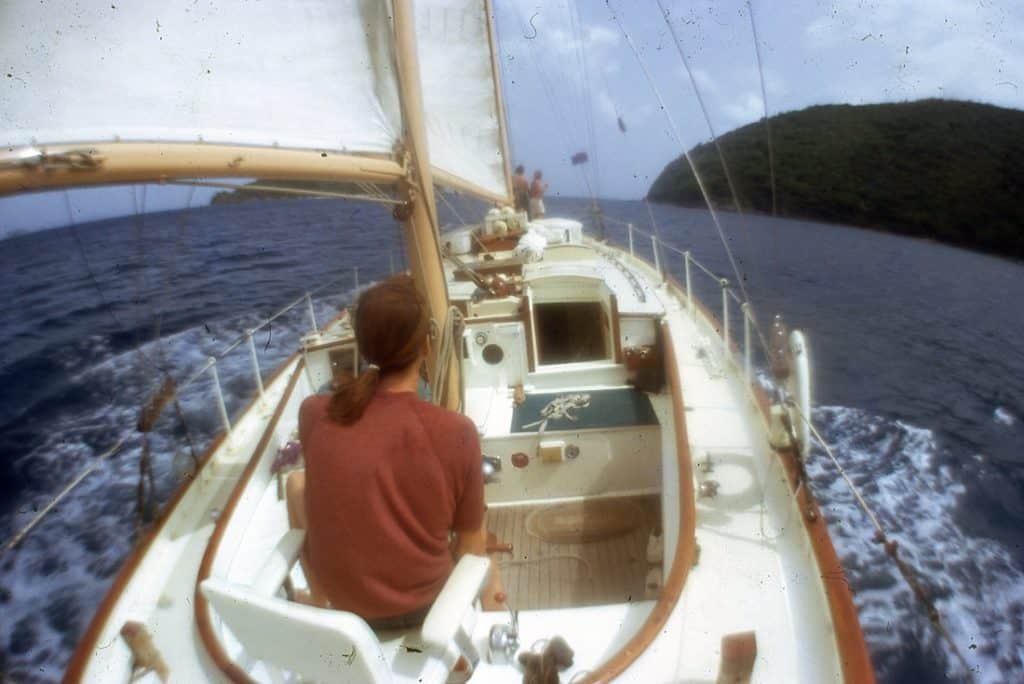“Music brought me to Baltimore on every occasion…”” —Steve Boone, sailor man
Back in the troubled year of 1968, in the last days of Lovin’ Spoonful, bass guitarist Steve Boone was invited to produce an album by some guy named James Taylor. It was two years before Sweet Baby James became a global superstar with “Fire and Rain.”
“I knew James was going to be a monster success,” said Boone, a prediction that came true with very nice paydays for everyone involved. Steve was 25 years old, just freed from the grind of big-time tours and disillusioned with the industry as only a successful musician can be.
The album production offer, said Boone, came from attorney Nat Weiss, the Beatles’ American representative. Taylor had just released his debut in Britain on the Fab Four’s Apple label and was preparing to record another. Did Boone want a shot at it?
He did not.
“I need a break from all this,” he told Weiss. “I’m going sailing.”
He spent the next three years in the U.S. Virgin Islands, living on a 56-foot racing schooner—originally the Beatrice B., renamed Cygnus. It was designed in the 1930s by renowned naval architect John Gale Alden and rebuilt in the Goudy & Stevens yard in East Boothbay, Maine.
In the James Taylor story we find two great passions that drive Boone to this day: music and life on the water. Born at Camp Lejeune and named for Stephen Decatur and John Paul Jones by his Marine father, Boone is now 77 and remains both an old-school rock star and a weathered sea dog.
At the height of Lovin’ Spoonful’s popularity (they placed nine songs in the U.S. Top 20 between 1966 and 1968), the Spoonful played 350 gigs, sharing bills with the Beach Boys and the Supremes, along with lesser acts like Chad & Jeremy.
In 2000, Boone was inducted with the original Spoonful into the Rock & Roll Hall of Fame. While Robbie Robertson of The Band has called life on the road “a goddamn impossible way of life,” Boone often refers to his journey as “many miles underthe keel.”
His lifelong pursuits most recently came together last year when the Spoonful (minus star frontman John “Welcome Back, Kotter” Sebastian) played the annual “Flower Power Cruise,” a floating boomer fest that also featured what remains of the Cowsills and Tommy James and the Shondells, among other 45 rpm superstars.
Having sailed upon many seas, Boone calls the Chesapeake Bay “home sweet home,” while declaring it sans compare.
“Being on the Chesapeake is like sailing back in time; all the creeks and rivers that feed it have fantastic history,” said Boone, who sailed the Bay extensively when he lived in Baltimore from the late 1970s through early-to-mid-80s. (He now resides in Flagler Beach, Fla.)

“It’s huge, but aside from the shipping lanes, it’s not deep. So you’ve mostly got pleasure boats and commercial fishing sharing the water with 900-foot freighters.”
Navigating in and around the big and the small, the commercial watermen, huge car carriers from the Far East, and weekend party boats can be a challenge. And anything that tests Boone’s instincts and acumen is what he likes best, be it on the water, on stage, or in the studio.
Around the age of five, he became obsessed with his father’s record collection, listening to Liszt and Chopin and Broadway musicals like Annie Get Your Gun while other kids were playing with trucks and blocks. He began sailing competitively in grade school and learned on his father’s Comet-class sailboat, which he later inherited.
Like his contemporary and one-time Manhattan neighbor Stephen Stills, who wrote “Treetop Flyer” about smuggling marijuana by small plane, Boone said he has also composed (but not recorded) a few “sailing for profit” tunes. Those voyages presented many challenges not taught in sailing school, particularly when the heat was on.
As documented in the Boone biography Hotter than a Matchhead: Life on the Run with the Lovin’ Spoonful, Boone deliberately sank two vessels bound for the U.S. with reefer from South America.
Off the coast of Ocean City in June 1979, Boone had time to unload 19,000 pounds of Colombian marijuana onto two 40-foot trawlers before sinking a 68-foot Rhodes Motorsailer named Do Deska Din. Boone and crew were then picked up, he said, by “associates.”
Another time, he sank the Miss Sun, named for a Boz Scaggs song. The vessel had lost control of its rudder near Cuba; so, with it dead in the water, Boone deep-sixed it, along with 6,300 pounds of marijuana.
When the Coast Guard cutter Decisive arrived, a bale of pot floated to the surface. Though officials could not prove the pot had come from the Miss Sun, this would be the end of Boone singing the smuggler’s blues.
From the early 1960s Greenwich Village folk scene to The Ed Sullivan Show and the oldies circuit, author Tony Moss details it all in the book Hotter Than a Match Head, which gets its title from the Spoonful’s No. 1 smash hit Summer in the City, from ’66. “Steve and I talked a lot about sailing while writing that book,” said Moss, an ESPN editor in Connecticut and the grandson of a Baltimore stevedore. “But we never sailed together.”
One vessel that didn’t need Boone’s help to find the bottom was a barge-cum-houseboat on which he installed a fabled recording studio called “Blue Seas.” The endeavor, docked in Baltimore’s Inner Harbor, was both miracle and disaster. On the barge was first-generation digital equipment along with old-school stuff, all of it hauled downtown from a Hunt Valley studio called ITI that a penniless Boone improbably acquired at a 1975 auction.
The late Lowell George, who recorded Feats Don’t Fail Me Now with Little Feat at the Hunt Valley location in ’74 (with back-up vocals from Emmylou Harris), cut a few demos on the barge. Earth, Wind and Fire bassist Verdine White, who discovered the Baltimore R&B group Pockets, did the same. Boone recorded a few local acts who played No Fish Today and the Marble Bar, and it is believed that blues legend Sonny Terry also recorded on the barge.
On Christmas Day 1977, not unlike that errant bale of pot off the coast of Cuba, some strange and expensive goodies drifted past the old power plant on Pier Four along with the usual Inner Harbor trash: reels of audiotape, Boone’s Martin D-28 guitar, speaker monitors, other odds and ends of the recording trade, and a Steinway grand piano made the year George M. Cohan released “You’re a Grand Old Flag.”
After a lot of rumors, accusations, and criminal investigation, the sinking was ruled the fault of a failed bilge pump, faulty maintenance (lack of proper caulking), and too heavy a load. Boone’s recording career ended the same way his smuggling had: abrupt and wet.
The Martin acoustic was hauled out of the drink with a boat hook and bears a chip in the sound hold from its rescue. “I still have it,” said Boone, “it’s my go-to guitar.”
Today, Boone works to keep the Spoonful legacy and its monetization afloat on a Flagler canal where he lives with his spouse of 21 years, Lee Yester Boone, daughter of former Spoonful member Jerry Yester, the piano man on the band’s ’65 hit, “Do You Believe in Magic?”
After a lifetime of owning and piloting vessels both exotic and mainstream (he once drove a Chris-Craft sea skiff from the Inner Harbor to Ocean City via the C&D Canal and the Delaware River), Boone’s current ship of state is a small jon boat for fishing and relaxing in the evening.
His last time on the Chesapeake was Christmas of 2017, when he and Lee rented a house on Tilghman Island for the holiday. “All the watermen would leave the docks early in the morning,” he said. “And I’d get up at the crack of dawn to take pictures of them heading out.”



